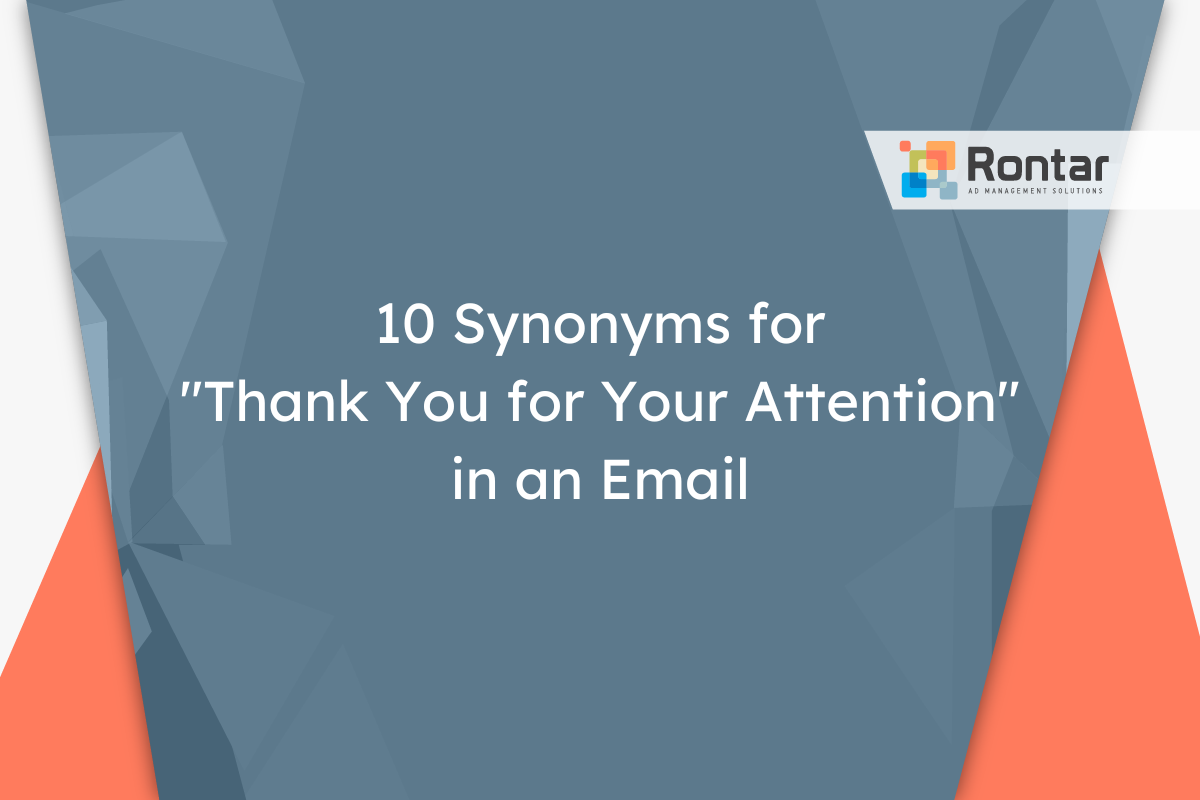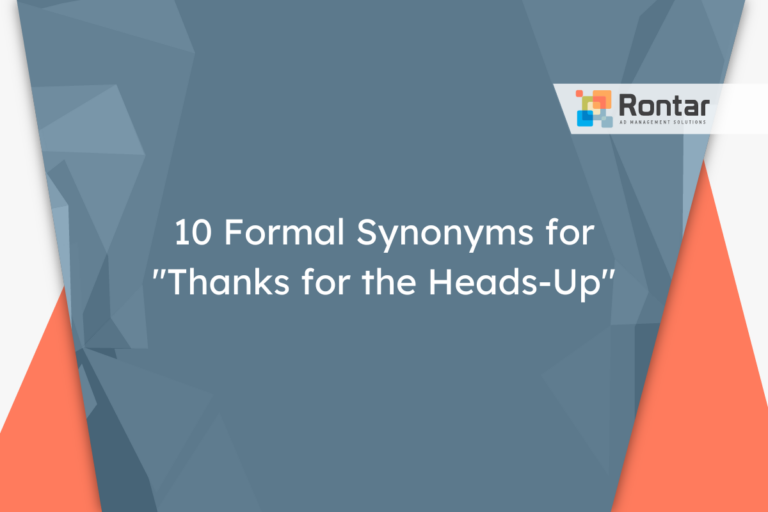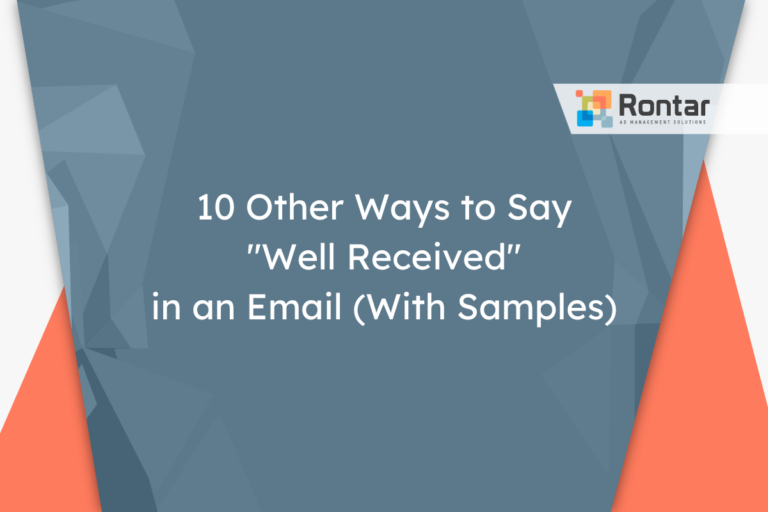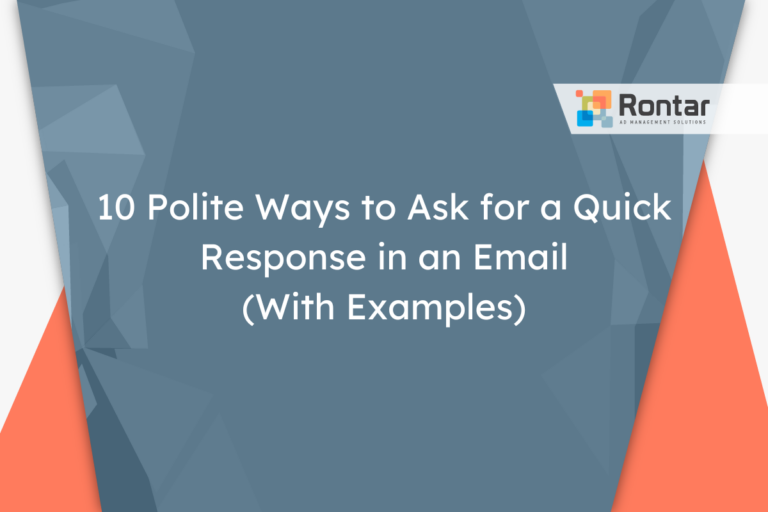10 Synonyms for “Thank You for Your Attention” in an Email

Email communication is a big part of professional life, and ending your messages with gratitude can leave a positive impression. But, using the same “thank you for your attention” over and over might become repetitive.
This article lists 10 professional alternatives to help you mix things up. Each suggested phrase is explained with when to use it and includes sample emails for guidance.
Is It Professional to Say “Thank You for Your Attention”?
Yes, it is professional to say “Thank you for your attention.” This phrase is considered formal and polite. It shows respect for the time and effort someone has put into reading your message. It’s best used in situations where you’ve shared important information and want to acknowledge the reader’s effort to understand it. This could be in professional emails, presentations, or meetings.
Here’s a simple example of how you might use this phrase in an email:
Dear Ms. Smith, I hope this message finds you well. I'm writing to share the final report on the project we discussed. I believe you'll find the results align with our objectives. Thank you for your attention to this matter. Best regards, Alex
In this email, “thank you for your attention” is used to politely wrap up the message, showing appreciation for the reader’s focus on the important content shared.
Pros:
- It shows appreciation for the recipient’s time.
- Enhances the professionalism of your communication.
- Leaves a positive impression on the reader.
Cons:
- Can feel overly formal in casual communications.
- May be redundant if the email is brief and to the point.
- Some might find it outdated in fast-paced digital communications.
While “thank you for your attention” is widely acceptable and professional, some might seek alternatives to freshen up their communication or to better fit the tone of their message. Different situations and audiences might call for a variation in language to maintain engagement or appear less formal. Using a synonym or an alternative phrase can help tailor your message more closely to your audience or the uniqueness of the situation.
10 Other Ways to Say “Thank You for Your Attention” in an Email
Expressions of gratitude can vary widely; here are ten professional alternatives for your emails.
- I appreciate your time.
- Thank you for taking the time.
- Thanks for your attention to this matter.
- Your attention to this is much appreciated.
- Thank you for listening.
- Thank you for hearing me out.
- I appreciate your attention.
- Thank you for your consideration.
- Appreciate your focus on this matter.
- Thanks for giving this your attention.
1. I appreciate your time
This alternative is polite and conveys gratitude for the recipient’s time investment. Compared to “Thank you for your attention,” it places more emphasis on valuing the recipient’s time directly. It is suitable for both professional and informal settings, making it versatile.
When you want to acknowledge someone’s busy schedule and show that you value the time they have spent, this phrase is better suited. It’s ideal for emails where the recipient had to dedicate time to read through lengthy content or perform a task.
Here’s a short lead-in for our sample email:
Hi Alex, I wanted to update you on the project timeline adjustments we discussed. Your feedback was invaluable, and the suggested new deadlines have now been approved. I appreciate your time. Best regards, Emily
2. Thank you for taking the time
This synonym adds a layer of personal touch by acknowledging the effort made by the recipient. It’s more specific than the original phrase and suggests that the sender understands the recipient’s effort. This alternative is perfect for professional messages where you want to acknowledge someone’s extra effort.
This phrase is better suited when you wish to emphasize the effort and time the recipient dedicated specifically to help or assist you. It’s great for emails that follow up on meetings, reviews, or detailed discussions.
Here’s a sample email using this alternative:
Hi Jordan, Your insights on the marketing proposal were incredibly helpful. Thank you for taking the time to review it in detail. Warm regards, Samantha
3. Thanks for your attention to this matter
This phrase is slightly more formal and specific than the original, making it an excellent choice for professional emails that address specific issues or topics. It shows appreciation for the recipient’s focus on the matter at hand.
When addressing issues that require careful consideration or action, this phrase is better suited. It’s particularly effective in emails that aim to resolve or highlight specific business or work-related matters.
For this alternative, here’s an example email:
Hello Mr. Thompson, We have completed the updates you requested on the project plan. Thanks for your attention to this matter. Best, Linda
4. Your attention to this is much appreciated
This alternative places a strong emphasis on gratitude and is slightly more formal. It’s an excellent way to express sincere thanks in professional communications, especially when addressing individuals who have dedicated effort towards a specific task or issue.
This phrase is better suited for situations where you wish to highlight and appreciate the recipient’s focus on critical details or tasks. It’s particularly useful in emails that involve project updates, feedback requests, or important announcements.
Here’s how you might use this phrase in an email:
Dear Committee Members, Your review of the budget proposals has been crucial to our decision-making process. Your attention to this is much appreciated. Regards, Henry
5. Thank you for listening
This alternative is less formal and conveys a sense of personal gratitude. It’s best suited for informal messages or when you’ve had a discussion (possibly virtual) and want to thank the recipient for being a good listener.
When you’ve shared important information, personal news, or sought advice and the recipient has offered their time to listen, this phrase is better suited. It’s perfect for emails following up on conversations or meetings where listening was key.
And here’s a sample message for this context:
Hey Maya, Our chat yesterday gave me a lot to think about regarding career choices. Thank you for listening. Cheers, Connor
6. Thank you for hearing me out
This phrase is similar to “Thank you for listening,” but it adds an element of completion, implying that the recipient has listened to the entire message or argument. It’s suitable for informal situations or more personal professional contexts.
When you have presented a case, shared a proposal, or explained a situation in full and seek to acknowledge the recipient’s patience and understanding, this alternative is better suited. It’s ideal for emails that follow discussions where you needed to convey your point fully.
Here’s an example email that fits:
Hi Lucas, Your willingness to consider my perspective on the project changes has been invaluable. Thank you for hearing me out. Best, Nina
7. I appreciate your attention
This phrase is a direct, polite way to thank someone, similar to “I appreciate your time” but focusing on the mental rather than temporal commitment. It’s versatile and can be used in both professional and informal emails.
When you want to specifically acknowledge someone’s mental engagement or concentration on a topic or message you’ve shared, this phrase is better suited. It’s great for emails where detailed content was presented, requiring the recipient’s focus.
For an example of this phrase in use, see this email:
Dear Dr. Patel, Your feedback on the research proposal has significantly improved our approach. I appreciate your attention. Sincerely, Ella
8. Thank you for your consideration
This alternative is formal and expresses gratitude for the recipient’s willingness to consider or reflect on the information provided. It’s ideal for professional settings, especially in emails that involve requests, proposals, or applications.
This phrase is better suited when your email aims to ask for something, such as support, approval, or feedback, and you wish to thank the recipient in advance for considering your request. It’s courteous and shows respect for the recipient’s decision-making process.
Here’s how this alternative could be used in an email:
Dear Hiring Manager, I am truly excited about the opportunity to join your team and contribute to your company's growth. Thank you for your consideration. Kind regards, Oliver
9. Appreciate your focus on this matter
This phrase is informal and direct, making it a good fit for emails where you have a familiar relationship with the recipient. It’s less formal than “Thanks for your attention to this matter” but still conveys gratitude effectively.
When you are addressing someone you know well and want to acknowledge their focused effort on a specific issue or task, this phrase is better suited. It’s perfect for follow-up emails after meetings or discussions about particular projects or problems.
Here’s a sample message utilizing this alternative:
Hi Kevin, The changes you suggested for the workflow have significantly improved our efficiency. Appreciate your focus on this matter. Thanks, Jenna
10. Thanks for giving this your attention
This alternative is a casual yet sincere way to express gratitude, suitable for both informal and less formal professional contexts. It’s a bit more relaxed than “Thank you for your attention” but still appropriate for many settings.
This phrase is better suited for situations where you want to convey appreciation in a friendly manner, especially when the recipient has taken the time to consider or work on something you’ve highlighted. It’s great for emails to colleagues or contacts with whom you have a good working relationship.
For an example of how to use this phrase, here’s a short email:
Hi Emma, The document you compiled for the client presentation was exactly what we needed. Thanks for giving this your attention. Cheers, Ryan
Final Thoughts
Communication is key in any professional setting, and how you end your emails can greatly impact your message’s reception. Using different ways to express gratitude not only shows your appreciation but also your attention to detail and consideration for the reader. By choosing from the ten alternatives provided, you can tailor your sign-offs to better match the tone and context of your messages.
Remember, a well-chosen phrase can strengthen your professional relationships and enhance your reputation. Use these examples as starting points and adapt them to fit your unique communications and style.






